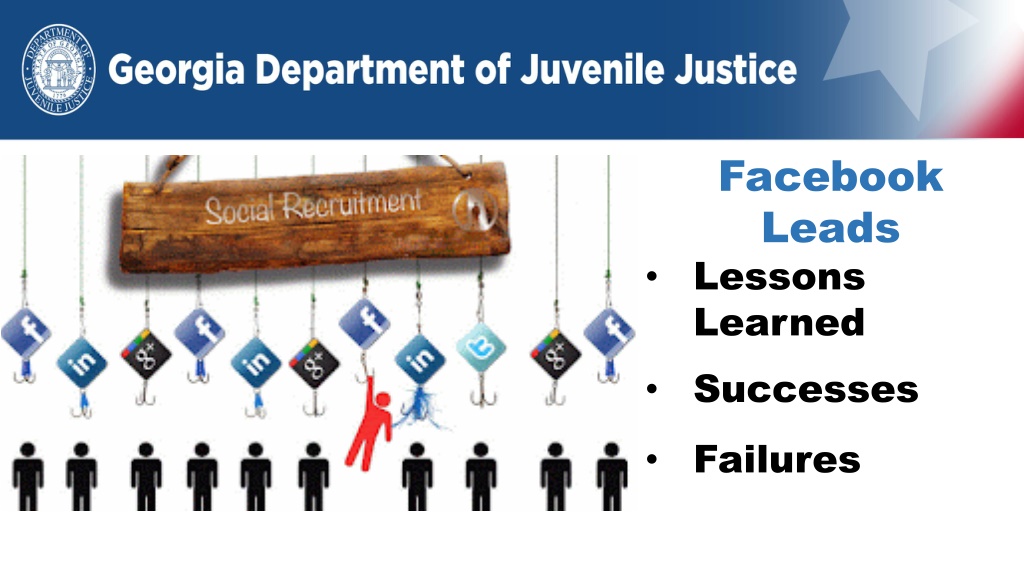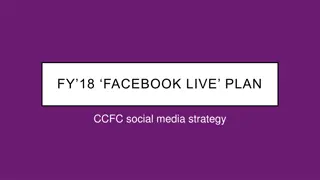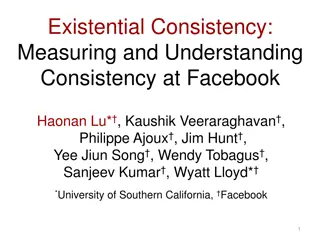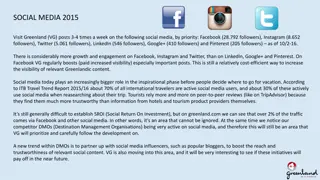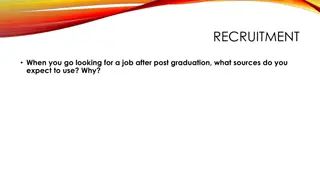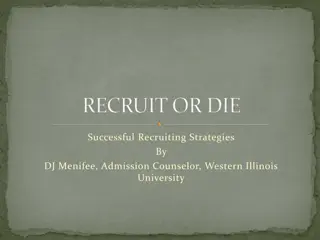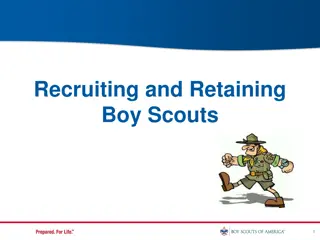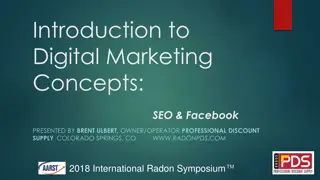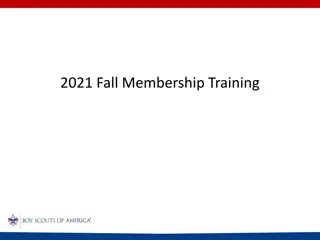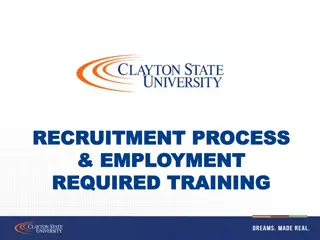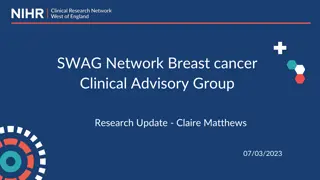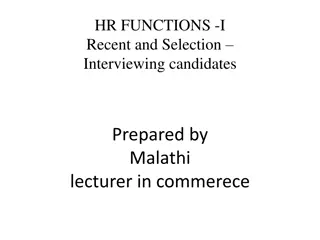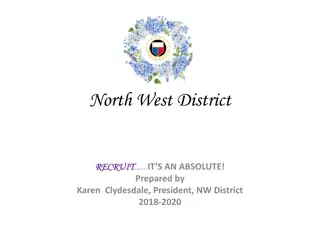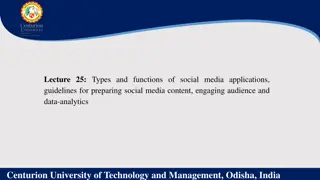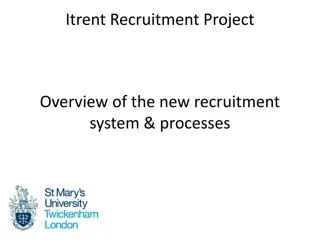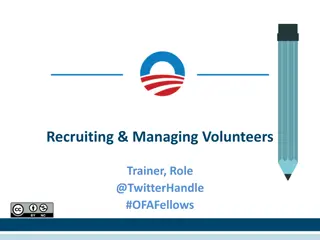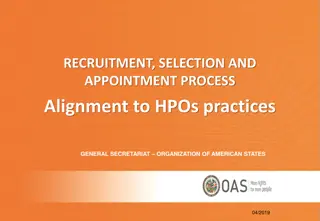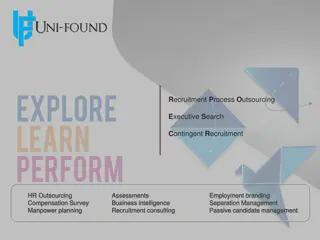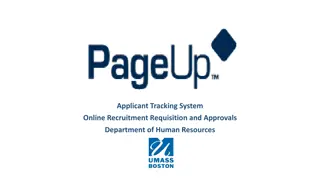Leveraging Facebook Leads for Successful Recruitment Strategies
In the digital era, utilizing Facebook Leads strategically can enhance recruitment efforts by tapping into a vast pool of potential candidates. By creating targeted ads, efficiently managing and organizing data, integrating with internal tools, and engaging with leads through personalized approaches, recruiters can streamline workflows and improve recruitment outcomes.
Download Presentation

Please find below an Image/Link to download the presentation.
The content on the website is provided AS IS for your information and personal use only. It may not be sold, licensed, or shared on other websites without obtaining consent from the author. Download presentation by click this link. If you encounter any issues during the download, it is possible that the publisher has removed the file from their server.
E N D
Presentation Transcript
Facebook Leads Lessons Learned Successes Failures
Facebook Leads: Overview In today's digital age, social media platforms have become powerful tools for various aspects of business, including recruitment. Facebook, being one of the most popular platforms with a vast user base, offers a valuable opportunity to generate leads for recruiting purposes.
Facebook Leads: Lessons Learned By leveraging the Facebook leads strategically, we tap into a large pool of potential candidates and streamline their recruitment. Facebook Leads provides an effective way to capture information from individuals who express interest in a particular opportunity with the Department of Juvenile Justice (DJJ).
Facebook Leads: Lessons Learned In the context of recruiting, it enables us to collect valuable data from potential candidates, such as their contact information and professional background information. By using this information, our recruiters can initiate targeted outreach and nurture relationships with prospects. To effectively utilize Facebook leads for recruiting, it is essential to follow a few key steps.
Facebook Leads: Lessons Learned Firstly, we created a targeted ads intended to capture the attention of our desired audience. These ads highlight the key selling points of the job or opportunity and encourage individuals to express interest by submitting their information. Once the leads are generated, it is crucial to have an efficient system in place for managing and organizing the data.
Facebook Leads: Lessons Learned We integrate the Facebook leads with our internal Electronic Tracking System (ETS) dedicated lead management tool. By centralizing the data and automating certain processes, our recruiters can streamline their workflows and ensure prompt follow-up with potential candidates. Additionally, it is important to engage with the leads in a timely and personalized manner.
Facebook Leads: Lessons Learned This is achieved through a combination of automated email sequences, personalized messages, and targeted content that addresses the specific interests and needs of the potential candidates. By building a relationship and providing relevant information, recruiters can nurture the leads and increase the likelihood of successful recruitment outcomes.
Facebook Leads: Lessons Learned Furthermore, continuous tracking and analysis of key metrics are essential to measure the effectiveness of Facebook leads campaigns for recruiting purposes. By monitoring conversion rates, cost per lead, and other relevant metrics, recruiters can refine their strategies and optimize their campaigns for better results over time.
Facebook Leads: Lessons Learned In conclusion, utilizing Facebook Leads for recruitment purposes can be a powerful strategy to generate leads and identify potential candidates. By creating compelling ads, effectively managing and nurturing leads, and analyzing campaign performance, organizations can leverage the vast reach of Facebook to streamline their recruitment processes and attract top talent.
Facebook Leads: Successes Increased Reach: Social media platforms provide recruiters with a vast audience reach that goes beyond traditional recruitment channels. By effectively leveraging these platforms, recruiters have successfully reached and engaged with a larger pool of potential candidates.
Facebook Leads: Successes Enhanced Branding: Social media outlets have allowed recruiters to showcase their DJJ s unique employer brand. By sharing compelling content, employee testimonials, and company updates, recruiters have successfully enhanced their employer brand perception, attracting candidates who resonate with their DJJ s culture and values.
Facebook Leads: Successes Streamlined Lead Capture: Facebook's lead forms and other social media lead generation tools have proven effective in capturing essential candidate information. Recruiters have successfully streamlined the lead capture process, enabling efficient data collection and follow-up.
Facebook Leads: Failures Ineffective Targeting: Poor targeting can result in low-quality leads or reaching an irrelevant audience. Recruiters have encountered challenges when their campaigns did not effectively narrow down the target audience, resulting in low conversion rates and wasted resources.
Facebook Leads: Failures Lack of Engagement: Simply posting job openings without actively engaging with the audience may lead to limited interaction and interest. Recruiters have learned that actively responding to comments, messages, and inquiries is crucial for building relationships with potential candidates and increasing engagement.
In summary, social media outlets, including Facebook, LinkedIn, Twitter, and Instagram, offer powerful tools for recruiters to generate leads and identify potential candidates. By leveraging the unique features of each platform, crafting engaging content, nurturing leads, and continuously analyzing performance, recruiters can harness the reach and targeting capabilities of social media to attract qualified candidates and achieve successful recruiting outcomes.
